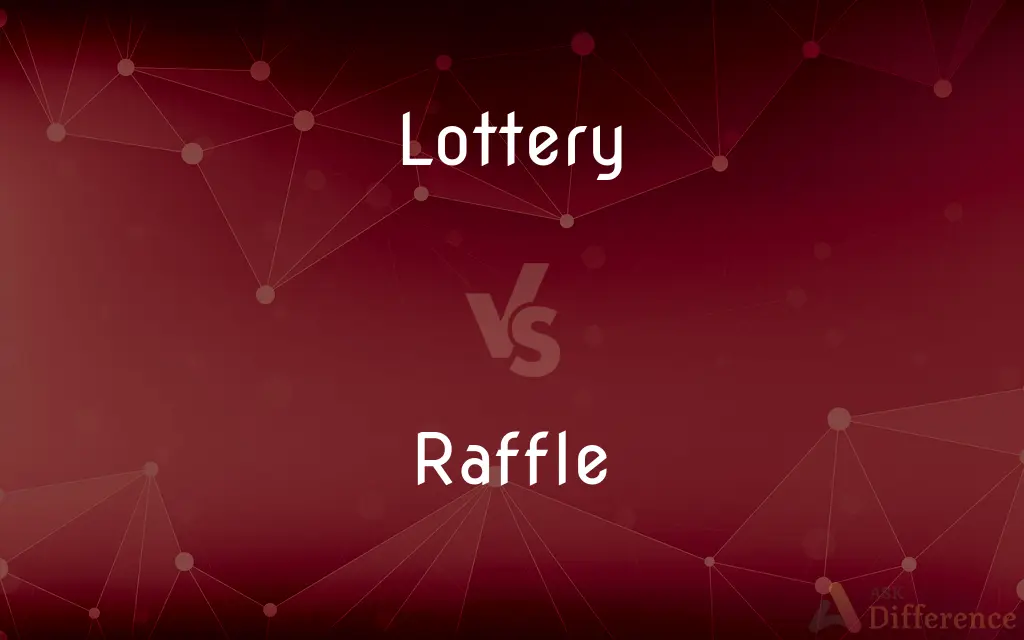Lottery vs. Raffle — What's the Difference?
By Maham Liaqat & Urooj Arif — Updated on March 8, 2024
Lotteries are games of chance where winners are drawn from participants who purchase tickets, while raffles involve drawing winners for prizes from tickets sold or given away.

Difference Between Lottery and Raffle
Table of Contents
ADVERTISEMENT
Key Differences
Lotteries are often large-scale games of chance regulated by governments, where participants buy tickets with the hope of winning cash or other significant prizes based on a random draw. They can be part of public funding initiatives, contributing to various social, educational, or infrastructure projects. Raffles, on the other hand, are smaller in scale and can be conducted by organizations or groups as part of fundraising events or promotional activities, offering specific prizes.
The primary purpose of lotteries is to generate revenue, often for the public sector, and they may operate on a continuous basis with regularly scheduled draws. Raffles are more frequently associated with specific events or causes, aiming to raise funds or awareness for a particular group or issue, and they may not occur as regularly as lotteries.
Lottery participants may have the opportunity to win large jackpots, which can reach millions of dollars, making the lottery a popular form of gambling on a national or state level. Raffle prizes, while potentially valuable, typically do not match the scale of lottery jackpots and are often predetermined items like electronics, trips, or even cars.
Lotteries often require participants to purchase tickets, which can be available through various channels including physical locations and online platforms. Raffles might distribute tickets in a similar manner, but they can also offer tickets for free as part of promotional activities, or in exchange for donations to a cause.
Understanding the differences between lotteries and raffles is crucial for participants, as the rules, regulations, and purposes of these games of chance can vary significantly. Both offer the excitement of winning based on luck, but they serve different roles within society and come with different considerations for participants.
ADVERTISEMENT
Comparison Chart
Scale
Often national or state-wide
Typically smaller, local or event-specific
Purpose
Generate revenue, often for public projects
Fundraise or promote for a specific cause or event
Prize Scale
Can reach millions of dollars
Usually smaller, specific items or services
Participation Cost
Purchase of tickets required
Tickets sold or given for free or in exchange for donations
Regulation
Heavily regulated by government bodies
Regulations vary, often less stringent than lotteries
Compare with Definitions
Lottery
A game of chance with participants buying tickets to win cash or prizes in a random draw.
The national lottery offers a jackpot of millions to lucky ticket holders.
Raffle
A form of lottery where tickets are sold or given away to win prizes.
The school raffle offers a chance to win a new laptop for a small ticket purchase.
Lottery
Tickets available through multiple channels, often including online.
You can purchase lottery tickets from authorized retailers or online platforms.
Raffle
Subject to local laws and regulations, often less stringent than lotteries.
The charity raffle operates under specific guidelines issued by the local authority.
Lottery
Potential for large, life-changing sums of money.
Lottery jackpots can accumulate to substantial amounts, attracting many participants.
Raffle
Tickets can be sold, but also offered in exchange for donations.
Raffle tickets are offered at the event entrance or in exchange for contributions.
Lottery
Primarily aimed at raising funds for public sector initiatives.
Lottery earnings often contribute to educational and infrastructure projects.
Raffle
Prizes are often predetermined and can range from items to experiences.
Prizes include gadgets, holiday packages, and gift certificates.
Lottery
Strictly controlled by governmental regulations.
The state lottery commission oversees all operations and ensures fair play.
Raffle
Commonly used to raise money for charities, schools, and clubs.
Proceeds from the raffle will support the local community center renovation.
Lottery
A lottery is a form of gambling that involves the drawing of numbers at random for a prize. Some governments outlaw lotteries, while others endorse it to the extent of organizing a national or state lottery.
Raffle
A raffle is a gambling competition in which people obtain numbered tickets, each of which has the chance of winning a prize. At a set time, the winners are drawn at random from a container holding a copy of each number.
Lottery
A contest in which tokens are distributed or sold, the winning token or tokens being secretly predetermined or ultimately selected in a random drawing.
Raffle
A lottery in which a number of persons buy chances to win a prize.
Lottery
A selection made by lot from a number of applicants or competitors
The state uses a lottery to assign spaces in the campground.
Raffle
Rubbish; debris.
Lottery
An activity or event regarded as having an outcome depending on fate
They considered combat duty a lottery.
Raffle
To dispose of in a raffle. Often used with off.
Lottery
A scheme for the distribution of prizes by lot or chance, especially a gaming scheme in which one or more tickets bearing particular numbers draw prizes, the other tickets are blanks.
Dave plays the lottery almost every week, but always picks different numbers.
Raffle
To conduct or take part in a raffle.
Lottery
(figuratively) Something decided by chance.
It's a bit of a lottery whether we'll get a good table in that diner.
Raffle
A drawing, often held as a fundraiser, in which tickets or chances are sold to win a prize.
He entered a raffle to win a lifetime supply of toothpaste, but he did not win.
Lottery
(obsolete) Allotment; a thing allotted.
Raffle
(obsolete) A game of dice in which the player who throws three of the same number wins all the stakes.
Lottery
A scheme for the distribution of prizes by lot or chance; esp., a gaming scheme in which one or more tickets bearing particular numbers draw prizes, and the rest of the tickets are blanks.
Raffle
Refuse; rubbish
Lottery
Allotment; thing allotted.
Raffle
(transitive) To award something by means of a raffle or random drawing, often used with off.
They raffled off four gift baskets.
Lottery
Something that is regarded as a chance event;
The election was just a lottery to them
Raffle
(intransitive) To participate in a raffle.
To raffle for a watch
Lottery
Players buy (or are given) chances and prizes are distributed according to the drawing of lots
Raffle
A kind of lottery, in which several persons pay, in shares, the value of something put up as a stake, and then determine by chance (as by casting dice) which one of them shall become the sole possessor.
Raffle
A game of dice in which he who threw three alike won all the stakes.
Raffle
Refuse; rubbish; raff.
Raffle
To engage in a raffle; as, to raffle for a watch.
Raffle
To dispose of by means of a raffle; - often followed by off; as, to raffle off a horse.
Raffle
A lottery in which the prizes are goods rather than money
Raffle
Dispose of in a lottery;
We raffled off a trip to the Bahamas
Common Curiosities
Are raffles legal for fundraising?
Yes, raffles are commonly used for fundraising, but they must comply with local regulations, which can vary.
Can anyone organize a lottery?
Typically, lotteries are government-regulated and require specific licenses to operate, so not just anyone can organize one.
What makes lotteries a popular form of gambling?
The potential to win large monetary jackpots with a small ticket purchase makes lotteries a popular gambling choice.
Do you always have to buy a ticket to participate in a raffle?
Not always; raffle tickets can also be given away as part of promotional activities or in exchange for donations.
Can raffles have monetary prizes?
Yes, raffles can offer monetary prizes, but the amounts are typically smaller than lottery jackpots.
What is the main difference between a lottery and a raffle?
The main difference lies in their scale and purpose: lotteries are often large-scale and revenue-generating, while raffles are smaller and aimed at fundraising or promotion.
Is participation in a lottery or raffle a good way to support a cause?
While lotteries contribute to public projects, raffles are more directly tied to fundraising for specific causes, making them a more targeted way to support a cause.
How do prizes in lotteries and raffles differ?
Lottery prizes can be vast sums of money, while raffle prizes are usually specific items or services, often donated by sponsors.
Who regulates lotteries and raffles?
Lotteries are regulated by national or state government bodies, while raffles are subject to local laws and regulations.
Can non-profits hold lotteries?
Non-profits can hold raffles, which are a type of lottery, but large-scale lotteries are typically government-regulated. Non-profits must comply with specific regulations when organizing raffles.
Share Your Discovery

Previous Comparison
Annotation vs. Connotation
Next Comparison
Handcuff vs. ManacleAuthor Spotlight
Written by
Maham LiaqatCo-written by
Urooj ArifUrooj is a skilled content writer at Ask Difference, known for her exceptional ability to simplify complex topics into engaging and informative content. With a passion for research and a flair for clear, concise writing, she consistently delivers articles that resonate with our diverse audience.














































